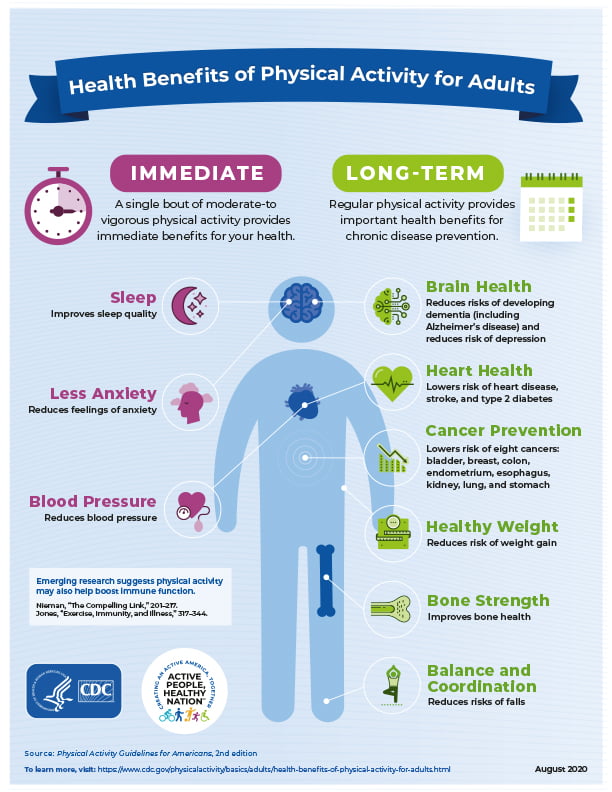Ever wondered how your lifestyle choices can impact your mental health? Well, let’s dive into the fascinating world of the mind and explore the connection between a healthy lifestyle and mental well-being. It’s not just about physical health, my friend; our mental well-being is equally important. So, grab a cup of tea, sit back, and let’s explore the question: “How can a healthy lifestyle affect mental health?”
When it comes to mental health, a healthy lifestyle can work wonders. It’s like giving your mind a much-needed spa day. Taking care of our physical health through regular exercise, nourishing our bodies with nutritious food, and getting enough sleep can have a profound impact on our mental well-being. It’s like fueling our mind with the good stuff it needs to thrive.
But that’s not all! A healthy lifestyle also involves managing stress levels, staying connected with loved ones, and engaging in activities that bring us joy. It’s about finding that balance between work, play, and self-care. So, let’s explore the fascinating ways in which a healthy lifestyle can positively influence our mental health and unlock a happier, more fulfilled life. Get ready to discover the secrets of nurturing your mind and body in harmony!

How Can a Healthy Lifestyle Affect Mental Health?
Living a healthy lifestyle has numerous benefits, and one of the most significant impacts is on mental health. Taking care of your physical well-being can greatly influence your mental well-being, leading to improved mood, reduced stress and anxiety, increased self-esteem, and overall better mental health. The mind and body are interconnected, and by prioritizing your health, you can experience significant positive effects on your mental state.
The Mind-Body Connection
The mind and body are not separate entities but rather intertwined aspects of our overall well-being. Physical exercise, proper nutrition, and adequate sleep have a direct impact on our mental health. When we engage in regular physical activity, our brain releases endorphins, which are natural mood-boosting chemicals. This can lead to a reduction in symptoms of depression and anxiety and an overall improvement in mental well-being. Additionally, a healthy diet rich in nutrients provides the brain with the necessary fuel to function optimally, supporting cognitive function and emotional stability.
Taking care of our physical health also promotes better sleep, which is essential for mental health. Poor sleep can contribute to increased stress, anxiety, and mood disturbances. By establishing healthy sleep habits, such as maintaining a consistent sleep schedule and creating a relaxing bedtime routine, we can improve our sleep quality, leading to enhanced mental clarity and emotional resilience.
The Benefits of Exercise on Mental Health
Regular exercise has been proven to have numerous positive effects on mental health. Engaging in physical activity increases blood flow to the brain, which enhances cognitive function and improves mood. Exercise also stimulates the release of endorphins, which are natural mood elevators. This can result in reduced feelings of stress, anxiety, and depression. Moreover, participating in exercise can provide a sense of accomplishment and boost self-esteem, contributing to overall improved mental well-being.
In addition to the immediate benefits, exercise has long-term effects on mental health. Research has shown that individuals who engage in regular physical activity have a lower risk of developing mental health disorders such as depression and anxiety. Exercise can also be an effective form of treatment for those already experiencing mental health issues. It can be used as a complementary therapy alongside traditional treatments or even as a standalone intervention. The positive impacts of exercise on mental health make it an essential component of a healthy lifestyle.
The Role of Nutrition in Mental Health
Proper nutrition is vital for overall health, including mental well-being. The foods we consume can significantly impact our mood, energy levels, and cognitive function. A diet rich in fruits, vegetables, whole grains, lean proteins, and healthy fats provides the necessary nutrients for optimal brain function. These nutrients support the production of neurotransmitters, such as serotonin and dopamine, which play a crucial role in regulating mood and emotions.
On the other hand, a diet high in processed foods, sugars, and unhealthy fats can have detrimental effects on mental health. Research has shown that diets that are high in these unhealthy components are associated with an increased risk of depression, anxiety, and other mental health disorders. By adopting a balanced and nutritious diet, we can support our mental well-being and promote a healthier mind.
The Importance of Sleep for Mental Health
Sleep is a fundamental aspect of mental health. It is during sleep that our bodies and minds rejuvenate and restore themselves. Sufficient and quality sleep is essential for cognitive function, emotional regulation, and overall well-being. Lack of sleep or poor sleep quality can lead to increased stress, irritability, difficulty concentrating, and impaired decision-making.
Establishing healthy sleep habits is crucial for optimal mental health. This includes maintaining a consistent sleep schedule, creating a sleep-friendly environment, and practicing relaxation techniques before bed. By prioritizing sleep and ensuring we get enough restful sleep each night, we can enhance our mental clarity, emotional stability, and overall mental well-being.
The Power of Stress Management
Chronic stress can take a toll on both our physical and mental health. It is important to develop effective stress management techniques to mitigate the negative effects of stress on our well-being. Engaging in activities that help us relax and unwind, such as meditation, yoga, deep breathing exercises, or engaging in hobbies, can significantly reduce stress levels and promote better mental health.
Moreover, incorporating self-care practices into our daily routine is essential for maintaining a healthy lifestyle and supporting mental well-being. This can include activities such as taking breaks, spending time with loved ones, practicing mindfulness, or engaging in activities that bring us joy. Prioritizing self-care allows us to recharge, reduce stress, and cultivate a positive mindset.
Building a Healthy Lifestyle for Optimal Mental Health
To build a healthy lifestyle that positively impacts mental health, it is important to focus on various aspects of well-being. This includes regular physical activity, a balanced and nutritious diet, sufficient sleep, stress management techniques, and self-care practices. By incorporating these elements into our daily routine, we can cultivate a healthier mind and body.
It is important to remember that mental health is a journey, and building a healthy lifestyle is an ongoing process. Small changes and consistent efforts can lead to significant improvements in mental well-being over time. By prioritizing our health and taking steps to care for our mind and body, we can experience the transformative power of a healthy lifestyle on our mental health.
Key Takeaways: How Can a Healthy Lifestyle Affect Mental Health?
- A healthy lifestyle can positively impact mental health by reducing stress levels.
- Regular exercise releases endorphins, which can improve mood and reduce symptoms of anxiety and depression.
- Eating a balanced diet rich in nutrients can provide the brain with the necessary fuel for optimal mental function.
- Adequate sleep is crucial for mental well-being, as it allows the brain to rest and recharge.
- Engaging in activities that bring joy and fulfillment, such as hobbies or spending time with loved ones, can boost mental health.
Frequently Asked Questions
Learn more about how a healthy lifestyle can affect mental health with these commonly asked questions:
1. What are the benefits of a healthy lifestyle on mental health?
A healthy lifestyle has numerous benefits on mental health. Engaging in regular physical activity releases endorphins, which are natural mood boosters. Exercise also helps reduce stress and anxiety levels, improves sleep quality, and enhances self-esteem and body image. Eating a balanced diet that includes fruits, vegetables, whole grains, and lean proteins supports brain function and promotes overall well-being. Additionally, practicing good sleep hygiene, managing stress effectively, and avoiding harmful substances like alcohol and tobacco can have a positive impact on mental health.
Incorporating healthy habits into your daily routine can lead to improved mental clarity, increased energy levels, and enhanced mood. By taking care of your physical health, you are also nurturing your mental well-being.
2. How does exercise affect mental health?
Exercise has been shown to have a profound impact on mental health. When you engage in physical activity, your body releases endorphins, which are natural chemicals that act as mood elevators. These endorphins not only help alleviate symptoms of depression and anxiety but also promote a sense of well-being and happiness.
Regular exercise also reduces stress and improves sleep patterns, both of which are crucial for maintaining good mental health. By incorporating exercise into your routine, you can experience reduced levels of stress, improved self-esteem, increased cognitive function, and enhanced overall mental well-being.
3. What role does nutrition play in mental health?
Nutrition plays a vital role in mental health. Eating a balanced diet that includes essential nutrients can support brain function and help regulate mood. Certain nutrients, such as omega-3 fatty acids found in fish, nuts, and seeds, have been linked to improved mental well-being and reduced risk of depression.
Avoiding excessive consumption of processed foods, sugary snacks, and caffeine can also contribute to better mental health. These foods can cause fluctuations in blood sugar levels, leading to mood swings and increased feelings of anxiety. By nourishing your body with wholesome, nutrient-rich foods, you provide the foundation for optimal mental health.
4. How does sleep impact mental health?
Sleep plays a crucial role in maintaining good mental health. Sufficient and quality sleep allows the brain to recharge and repair itself, promoting optimal cognitive function and emotional well-being. Lack of sleep can lead to increased irritability, difficulty concentrating, and heightened stress levels.
Good sleep hygiene practices, such as sticking to a consistent sleep schedule, creating a relaxing bedtime routine, and creating a sleep-friendly environment, can help improve sleep quality. Prioritizing sleep and ensuring you get the recommended amount of sleep each night can have a significant positive impact on your mental health.
5. How can stress management improve mental health?
Effective stress management is essential for maintaining good mental health. Chronic stress can have detrimental effects on both physical and mental well-being. Engaging in stress-reducing activities, such as practicing mindfulness meditation, deep breathing exercises, or engaging in hobbies and activities you enjoy, can help alleviate symptoms of stress and improve overall mental health.
It is important to identify and address sources of stress in your life, as well as develop healthy coping mechanisms to manage stress effectively. By taking proactive steps to manage stress, you can enhance your mental resilience and promote a healthier overall state of mind.

How does your diet impact mental health?
Final Summary: The Impact of a Healthy Lifestyle on Mental Health
Living a healthy lifestyle has a profound effect on our overall well-being, including our mental health. As we’ve explored in this article, there is a strong connection between our physical well-being and our mental state. By prioritizing a healthy lifestyle, we can significantly improve our mental health and overall quality of life.
One key aspect of maintaining a healthy lifestyle is through regular exercise. Exercise not only benefits our physical fitness but also has a positive impact on our mental health. It releases endorphins, the feel-good hormones, which can boost our mood and reduce symptoms of depression and anxiety. Incorporating physical activity into our daily routine can be as simple as taking a walk, dancing, or practicing yoga. Small changes can make a big difference.
In addition to exercise, a balanced diet is crucial for our mental health. Fueling our bodies with nutrient-rich foods provides the necessary vitamins and minerals that support brain function and emotional well-being. Avoiding processed foods and consuming a variety of fruits, vegetables, whole grains, and lean proteins can enhance our mood and cognitive abilities. Remember, a healthy mind starts with a healthy plate.
Sleep is another vital component of a healthy lifestyle that significantly impacts our mental health. Getting enough quality sleep allows our bodies and minds to recharge, improving focus, concentration, and emotional stability. Prioritizing a consistent sleep schedule and creating a relaxing bedtime routine can greatly enhance our overall well





